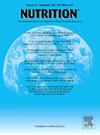营养状况与老年人的认知和握力有关:一项在加纳和南非进行的10年纵向研究
IF 3.2
3区 医学
Q2 NUTRITION & DIETETICS
引用次数: 0
摘要
目前的研究使用来自世卫组织全球老龄化和成人健康研究(SAGE)的三波数据,研究了营养状况与加纳和南非老年人认知和握力变化之间的关系。方法分别对来自加纳和南非数据集的6113例和3623例60岁以上成年人的记录进行评估。这些数据是从2007年至2019年进行的三波SAGE中提取的。采用六项迷你营养评估-简短问卷、五项认知能力测试和测力仪分别测量营养状况、认知能力和握力。数据分析采用单因素方差分析和线性混合模型。结果在调整所有显著协变量后,营养不良风险的参与者(加纳3.05[标准误差(SE) = 0.56], P <;0.0001;南非3.79 [SE = 1.58], P = 0.016)和营养状况良好的人(加纳6.36 [SE = 0.59], P <;0.0001;南非8.30 [SE = 1.56], P <;0.0001)的认知得分明显高于营养不良的参与者。在加纳和南非,在所有三个研究波中,营养状况类别之间的握力存在显著差异(方差分析Ghana W1: P <;0.0001, w2: p = 0.0007, w3: p = 0.0043;南非P <;0.0001)。在被分类为营养不良风险的参与者中(加纳;2.69 [SE = 0.47], P <;0.0001;南非;4.18 [SE = 2.02], P = 0.038)或营养状况良好(加纳;4.27 [SE = 0.51], P <;0.0001;南非;9.76 [SE = 1.97], P <;0.0001),与两国被列为营养不良的参与者相比。在调整协变量后,这些差异在加纳仍然显著,但仅适用于南非营养状况良好的人。本研究证实了加纳和南非老年人的营养状况与认知功能和握力之间的纵向正相关。这些发现突出了营养干预的重要性,以促进低收入和中等收入国家人口获得充足的营养饮食。本文章由计算机程序翻译,如有差异,请以英文原文为准。
Nutritional status is associated with cognition and grip strength among older adults: A 10-y longitudinal study in Ghana and South Africa
Objectives
The current study examined the association between nutritional status and changes in cognition and grip strength among older Ghanaian and South African adults over time using three waves of data from the WHO Study on global AGEing and adult health (SAGE).
Methods
In total, 6113 and 3623 records of adults aged 60+ y were assessed from Ghanaian and South African datasets, respectively. These were extracted from three waves of the SAGE, conducted between 2007 and 2019. The six-item Mini Nutritional Assessment–Short Form questionnaire, five cognitive performance tests, and dynamometer were used to measure nutritional status, cognition, and handgrip strength, respectively. Data were analyzed by one-way analysis of variance and linear mixed models.
Results
After adjusting for all significant covariates, participants at risk of malnutrition (Ghana 3.05 [Standard error (SE) = 0.56], P < 0.0001; South Africa 3.79 [SE = 1.58], P = 0.016) and those with adequate nutritional status (Ghana 6.36 [SE = 0.59], P < 0.0001; South Africa 8.30 [SE = 1.56], P < 0.0001) had significantly higher cognitive scores compared with malnourished participants. In both Ghana and South Africa, handgrip strength was significantly different between the categories of nutritional status in all three study waves (analysis of variance Ghana W1: P < 0.0001, W2: P = 0.0007, W3: P = 0.0043; South Africa P < 0.0001 for all). Significantly higher handgrip strength was measured in participants either classified at risk of malnutrition (Ghana; 2.69 [SE = 0.47], P < 0.0001; South Africa; 4.18 [SE = 2.02], P = 0.038) or those with adequate nutritional status (Ghana; 4.27 [SE = 0.51], P < 0.0001; South Africa; 9.76 [SE = 1.97], P < 0.0001) compared with participants classified as malnourished in both countries. After adjustment for covariates, these differences remained significant in Ghana, but only for those with adequate nutritional status in South Africa.
Conclusions
This study confirmed a positive longitudinal association between nutritional status and both cognitive function and hand grip strength for older adults in Ghana and South Africa. These findings highlight the importance of nutritional intervention to promote access to adequate, nutritious diets as people in low- and middle-income countries age.
求助全文
通过发布文献求助,成功后即可免费获取论文全文。
去求助
来源期刊

Nutrition
医学-营养学
CiteScore
7.80
自引率
2.30%
发文量
300
审稿时长
60 days
期刊介绍:
Nutrition has an open access mirror journal Nutrition: X, sharing the same aims and scope, editorial team, submission system and rigorous peer review.
Founded by Michael M. Meguid in the early 1980''s, Nutrition presents advances in nutrition research and science, informs its readers on new and advancing technologies and data in clinical nutrition practice, encourages the application of outcomes research and meta-analyses to problems in patient-related nutrition; and seeks to help clarify and set the research, policy and practice agenda for nutrition science to enhance human well-being in the years ahead.
 求助内容:
求助内容: 应助结果提醒方式:
应助结果提醒方式:


